Module 6 Unexplained Mysteries of the Natural World Function & Grammar PPT课件(38张ppt)
文档属性
| 名称 | Module 6 Unexplained Mysteries of the Natural World Function & Grammar PPT课件(38张ppt) |
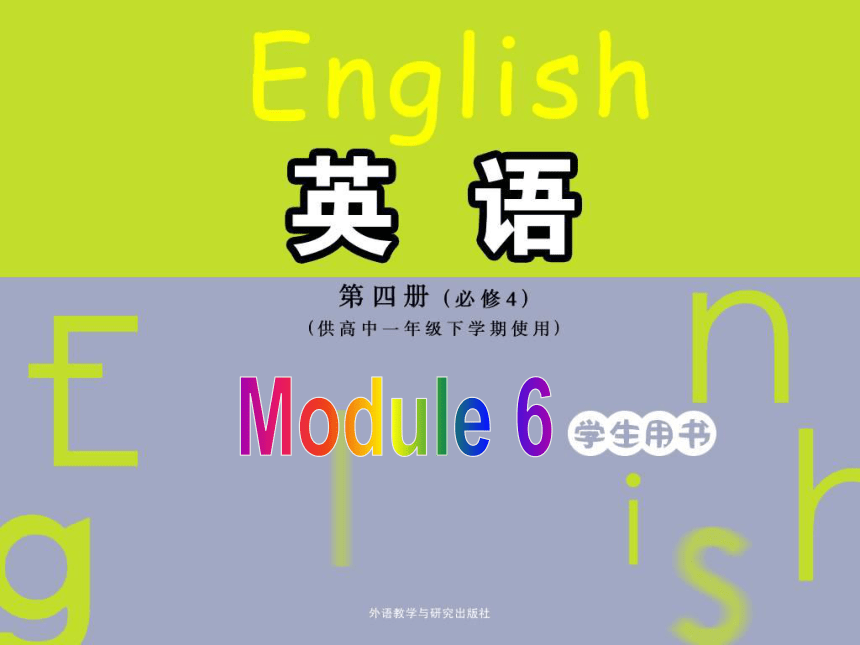
|
|
| 格式 | zip | ||
| 文件大小 | 1.7MB | ||
| 资源类型 | 教案 | ||
| 版本资源 | 外研版 | ||
| 科目 | 英语 | ||
| 更新时间 | 2022-01-30 00:00:00 | ||
图片预览

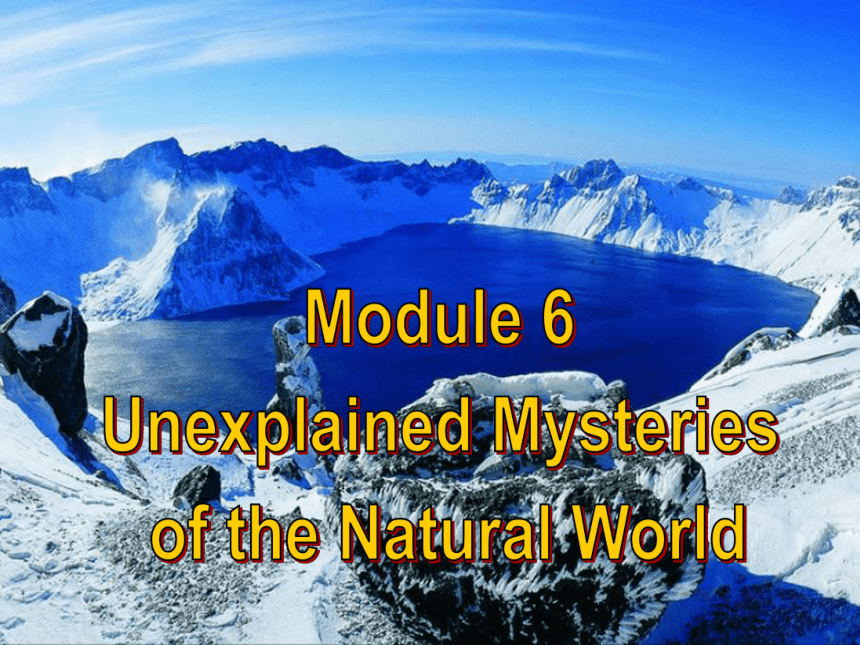
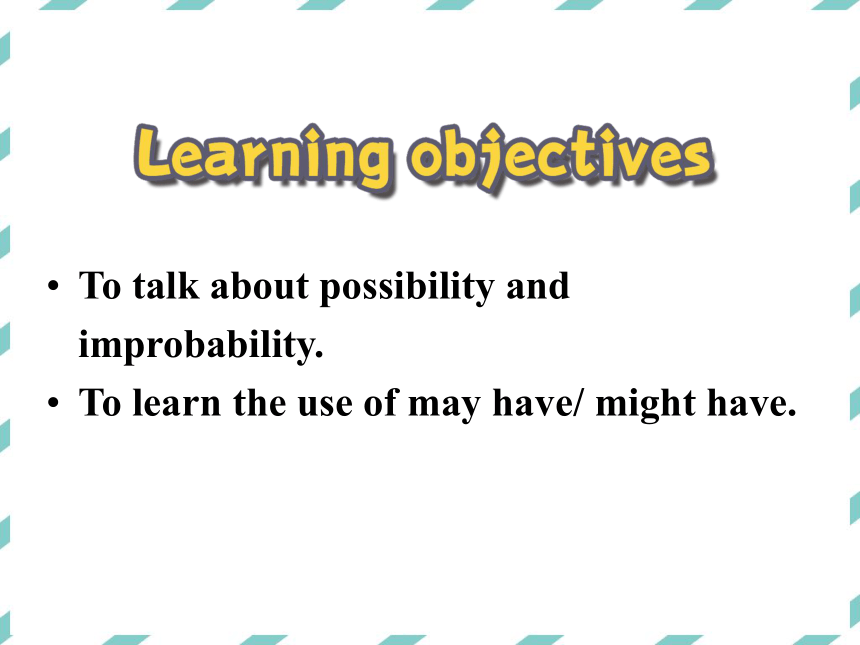

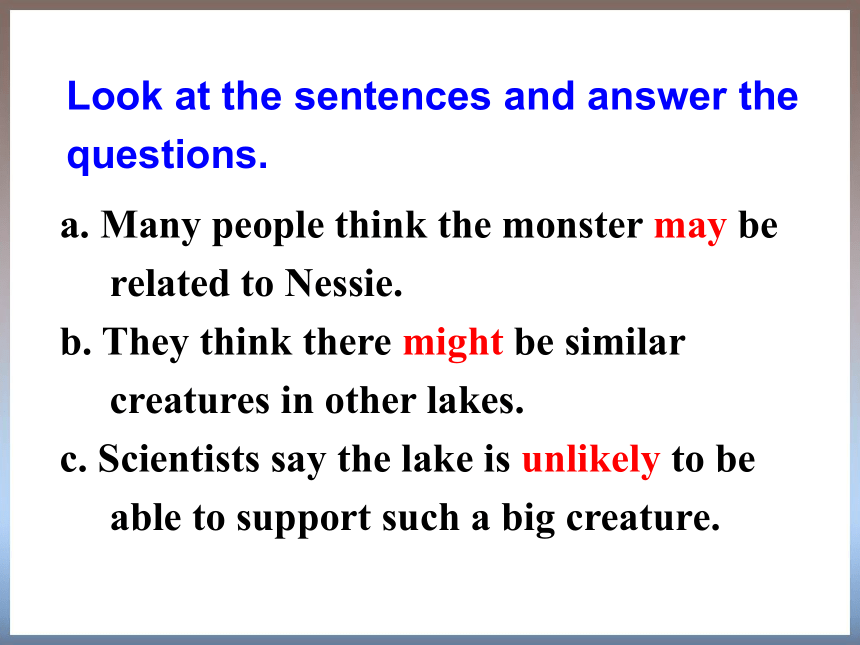

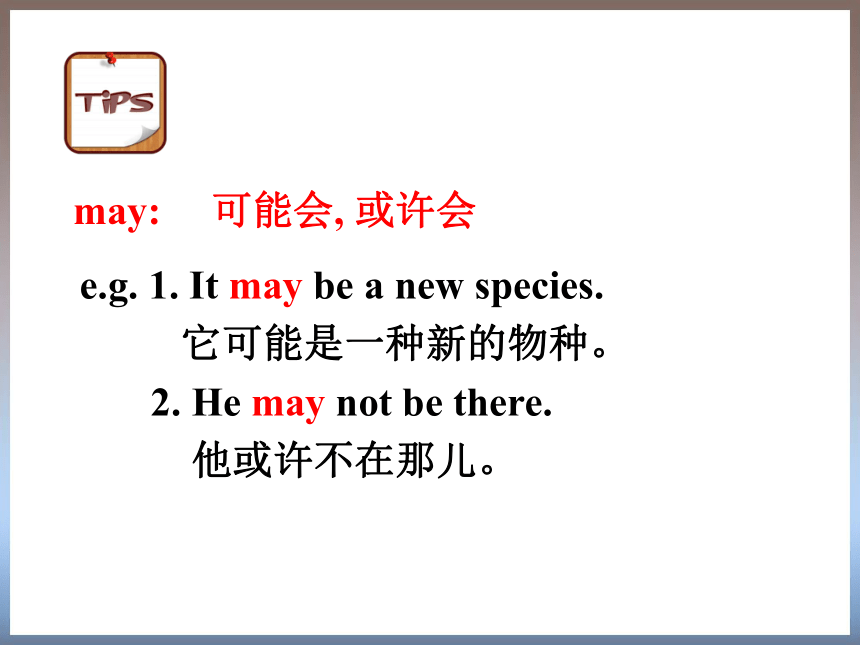

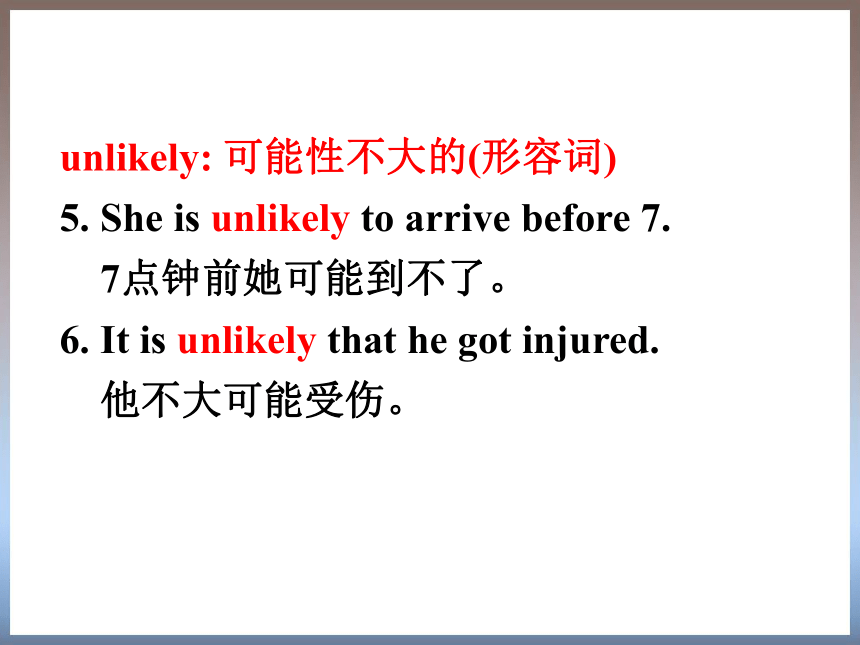
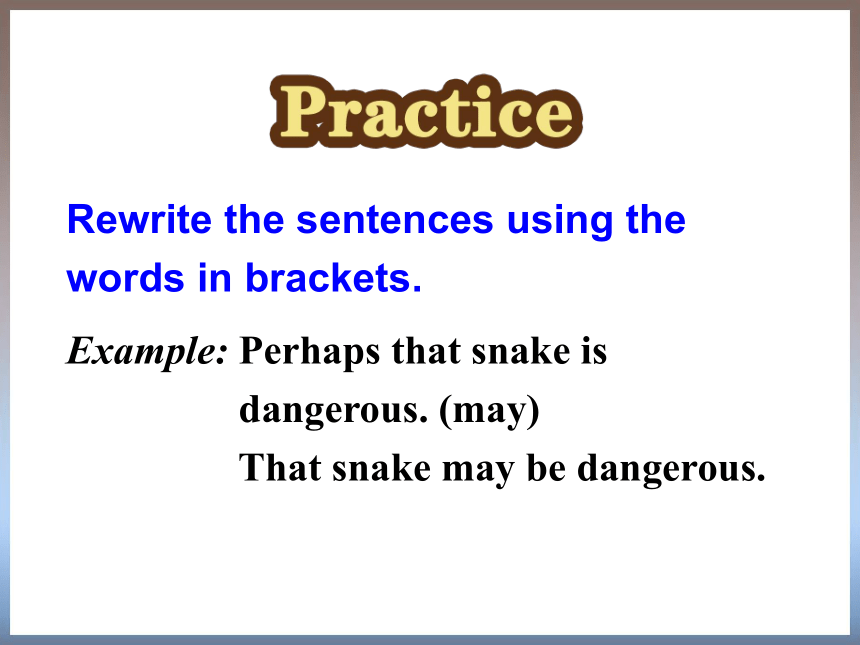
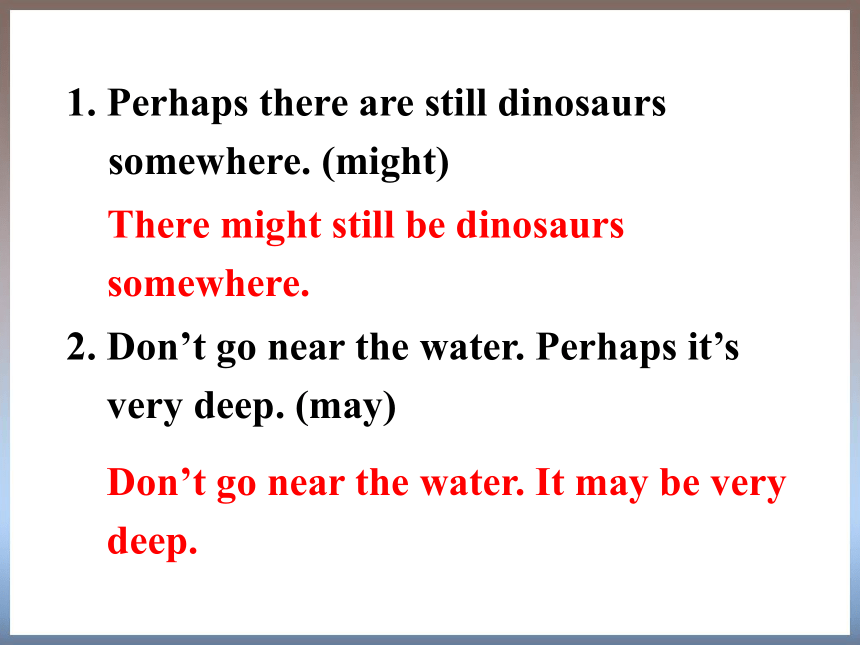
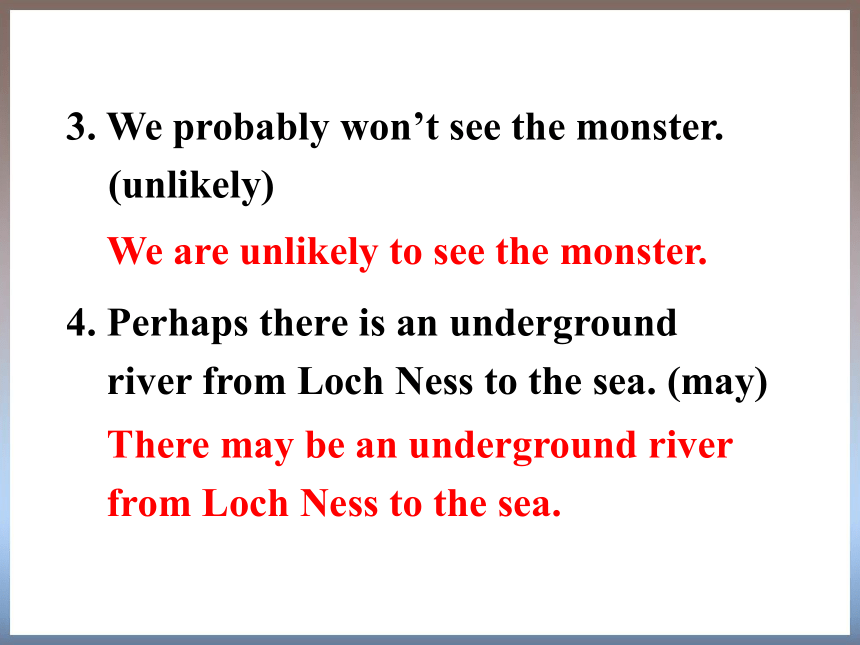
文档简介
(共38张PPT)
Module 6
Module 6
Unexplained Mysteries
of the Natural World
To talk about possibility and improbability.
To learn the use of may have/ might have.
Talking about possibility and improbability
a. Many people think the monster may be related to Nessie.
b. They think there might be similar creatures in other lakes.
c. Scientists say the lake is unlikely to be able to support such a big creature.
Look at the sentences and answer the questions.
1. Which sentences say that something is
possible
2. Which sentences say that something is
impossible
unlikely
c
a, b
3. Which word is followed by to + verb
a. Many people think the monster may be related to Nessie.
b. They think there might be similar creatures in other lakes.
c. Scientists say the lake is unlikely to be able to support such a big creature.
may: 可能会, 或许会
e.g. 1. It may be a new species.
它可能是一种新的物种。
2. He may not be there.
他或许不在那儿。
might: 可能, 或许 (语气较may更不肯定)
3. His suggestion might be worth thinking
about.
他的建议或许值得考虑。
4. I have got a lot of books that might
interest you.
我有许多或许你感兴趣的书。
unlikely: 可能性不大的(形容词)
5. She is unlikely to arrive before 7.
7点钟前她可能到不了。
6. It is unlikely that he got injured.
他不大可能受伤。
Rewrite the sentences using the words in brackets.
Example: Perhaps that snake is
dangerous. (may)
That snake may be dangerous.
1. Perhaps there are still dinosaurs somewhere. (might)
There might still be dinosaurs somewhere.
2. Don’t go near the water. Perhaps it’s
very deep. (may)
Don’t go near the water. It may be very deep.
3. We probably won’t see the monster. (unlikely)
We are unlikely to see the monster.
4. Perhaps there is an underground
river from Loch Ness to the sea. (may)
There may be an underground river from Loch Ness to the sea.
5. We must help him – perhaps he can’t swim! (may)
We must help him – he may not be able to swim.
6. There are probably lots of strange
creatures in that lake. (likely)
There are likely to be lots of strange creatures in that lake.
Identify the creatures. Use may or might.
情态动词 + have done
Read the sentences from the interview of Listening.
a. The dinosaurs may have stopped evolving,
and been unable to adapt to changes in the climate.
b. They might have killed each other.
We use may have or might have (with the past participle) to talk about ____.
1. something which happened in the
past – perhaps.
2. something which is impossible.
3. something which may happen in the
future.
1
情态动词may / might用法
1. may / might表示推测,“可能,或
许”,其中might表示的可能性较小,
含义更不确定。
2. may“可以”,用于表示说话人同意、许可做某事。
might表示过去的“允许”。
3. 在疑问句中用于征询对方的许可,肯定回答常用may,否定回答常用may not / mustn’t。
e.g.
1) I may be late, so don’t wait for me.
2) That might be our taxi (but I am not sure).
3) The director is alone now. So you may see him now.
4) She said he might borrow her dictionary.
5) —May/Might I smoke in this room
—Yes, you may. / No, you may not /
mustn’t.
【拓展】
may / might表示推测时还可用进行式或完
成式。
e.g. They may / might be waiting at the station.
They may / might have called while you were out.
1. Jack didn’t come on time. He may / might have missed the bus.
may/might have done表示对已经发生过的情况的肯定推测,意为“可能发生了某事”,语气稍弱。
e.g. John isn’t at home. I think he
may/might have gone to school.
约翰不在家,我想他可能去上
学了吧。
2. Since nobody gave him any help, he must have done the research on his own.
must have done表示对过去已经发生过的情况的肯定推测,意为“一定做过某事”,语气较强。
e.g. It must have rained last night, for
the road is quite muddy.
昨晚一定下雨了,因为路面很泥
泞。
3. —Sorry, Mum! I failed the job interview again.
—Oh, it’s too bad. You should have made better preparations. Instead you spent all your time playing computer games.
should have done表示“本应该做某事,而实际上并没有做”。
e.g. I really regret wasting the hours when I
should have studied hard, but it is too late.
我真的很后悔该努力学习的时候浪费了太
多时间,但现在太晚了。
4. I shouldn’t have watched that movie — it’ll give me horrible dreams.
shouldn’t have done表示“本不应该做某事,而实际上却做了”,含有批评、责备或惋惜的意思。
e.g. Look, Tom is crying. I shouldn’t
have been so strict with him.
看,汤姆哭了,我本来不应该对
他如此严厉。
5. I needn’t have worried before I came to the new school, for my classmates here are friendly to me.
needn’t have done表示“本不必做某事,而实际上却做了”。
e.g. It’s only five minutes’ walk. We
needn’t have taken a taxi.
只有五分钟的步行路程,我们本不
必乘出租车的。
6. He could have escaped, but he chose to stand and fight.
could have done表示“过去本来能够做某事,而实际上没有做”。
e.g. Mr. Smith can’t have gone to
Beijing, for I saw him in the
library just now.
史密斯先生不可能去北京了,我刚
才还在图书馆见过他。
7. —Why are your eyes so red You
can’t / couldn’t have slept well last night.
—Yeah, I stayed up late writing a report.
can’t / couldn’t have done表示“过去不
可能做了某事”。
【语境应用】用情态动词补全下面对话。
Lucia: I wonder where Peter’s got to. He said he’d be here in time for lunch. I’m rather worried.
Helen: Don’t worry! He 1. __________ still come.
Lucia: I doubt it. It’s past 2 o’clock. I think he 2. ________ have rung me up! But he didn’t!
may/might
should
Helen: Maybe his boss couldn’t give him time off, after all!
Lucia: Yes, that’s possible, I suppose. Or he 3. __________ have had an accident! Do you think I should phone the police
Helen: Dear me, no! Don’t fuss (大惊小怪)!
may/might
He 4. _________ be on his way right now!
(Ten minutes later, the phone rings.)
Peter: Sorry, Lucia, but I can’t get away from the office. An urgent piece of work. It 5. __________ be 8 or 9 when I get home.
Lucia: OK. Then I’m sure you 6. _______ have had your lunch, right
Peter: Yes. My boss gave me a treat (款待).
must
may/might
may/might
1. In today’s information age, the loss of data _______ cause serious problems for a company. (2018北京)
2. I can't find my purse. I _____________ (leave) it in the supermarket yesterday, but I'm not sure. (2018天津)
can
could have left
3. It’s strange that he _______ have taken the books without the owner’s permission. (2018江苏)
should
4. George _____ too far. His coffee is still warm. (2016浙江)
A. must have gone B. might have gone C. can’t have gone D. needn’t have gone
5. I ______ have worried before I came to the new school, for my classmates here are very friendly to me. (2015天津)
A. mightn’t B. mustn’t
C. needn’t D. couldn’t
情态动词+have done
该结构一般有两个主要用法:一是表示对过去发生的动作或状态的推测,二是表示对过去发生的动作的遗憾或责备。
Complete the sentences using may have / might have and the correct form of the verbs in brackets. (Two of them should be in the passive voice.)
1. The meteorite _________________
(cause) a huge dust cloud.
might have caused
2. The dust cloud __________________
(cut off) the sunlight.
3. Small animals ___________________
(survive) by eating nuts and seeds.
4. The dinosaurs ___________________
(kill) by volcanic eruptions.
might have cut off
may have survived
might have been killed
Finish Exercise 3 on page 55, then compare your ideas in a group of four.
Think of some more reasons why the dinosaurs might have disappeared. Use may have/ might have. Share your ideas with the rest of the class, and decide which are the best.
Module 6
Module 6
Unexplained Mysteries
of the Natural World
To talk about possibility and improbability.
To learn the use of may have/ might have.
Talking about possibility and improbability
a. Many people think the monster may be related to Nessie.
b. They think there might be similar creatures in other lakes.
c. Scientists say the lake is unlikely to be able to support such a big creature.
Look at the sentences and answer the questions.
1. Which sentences say that something is
possible
2. Which sentences say that something is
impossible
unlikely
c
a, b
3. Which word is followed by to + verb
a. Many people think the monster may be related to Nessie.
b. They think there might be similar creatures in other lakes.
c. Scientists say the lake is unlikely to be able to support such a big creature.
may: 可能会, 或许会
e.g. 1. It may be a new species.
它可能是一种新的物种。
2. He may not be there.
他或许不在那儿。
might: 可能, 或许 (语气较may更不肯定)
3. His suggestion might be worth thinking
about.
他的建议或许值得考虑。
4. I have got a lot of books that might
interest you.
我有许多或许你感兴趣的书。
unlikely: 可能性不大的(形容词)
5. She is unlikely to arrive before 7.
7点钟前她可能到不了。
6. It is unlikely that he got injured.
他不大可能受伤。
Rewrite the sentences using the words in brackets.
Example: Perhaps that snake is
dangerous. (may)
That snake may be dangerous.
1. Perhaps there are still dinosaurs somewhere. (might)
There might still be dinosaurs somewhere.
2. Don’t go near the water. Perhaps it’s
very deep. (may)
Don’t go near the water. It may be very deep.
3. We probably won’t see the monster. (unlikely)
We are unlikely to see the monster.
4. Perhaps there is an underground
river from Loch Ness to the sea. (may)
There may be an underground river from Loch Ness to the sea.
5. We must help him – perhaps he can’t swim! (may)
We must help him – he may not be able to swim.
6. There are probably lots of strange
creatures in that lake. (likely)
There are likely to be lots of strange creatures in that lake.
Identify the creatures. Use may or might.
情态动词 + have done
Read the sentences from the interview of Listening.
a. The dinosaurs may have stopped evolving,
and been unable to adapt to changes in the climate.
b. They might have killed each other.
We use may have or might have (with the past participle) to talk about ____.
1. something which happened in the
past – perhaps.
2. something which is impossible.
3. something which may happen in the
future.
1
情态动词may / might用法
1. may / might表示推测,“可能,或
许”,其中might表示的可能性较小,
含义更不确定。
2. may“可以”,用于表示说话人同意、许可做某事。
might表示过去的“允许”。
3. 在疑问句中用于征询对方的许可,肯定回答常用may,否定回答常用may not / mustn’t。
e.g.
1) I may be late, so don’t wait for me.
2) That might be our taxi (but I am not sure).
3) The director is alone now. So you may see him now.
4) She said he might borrow her dictionary.
5) —May/Might I smoke in this room
—Yes, you may. / No, you may not /
mustn’t.
【拓展】
may / might表示推测时还可用进行式或完
成式。
e.g. They may / might be waiting at the station.
They may / might have called while you were out.
1. Jack didn’t come on time. He may / might have missed the bus.
may/might have done表示对已经发生过的情况的肯定推测,意为“可能发生了某事”,语气稍弱。
e.g. John isn’t at home. I think he
may/might have gone to school.
约翰不在家,我想他可能去上
学了吧。
2. Since nobody gave him any help, he must have done the research on his own.
must have done表示对过去已经发生过的情况的肯定推测,意为“一定做过某事”,语气较强。
e.g. It must have rained last night, for
the road is quite muddy.
昨晚一定下雨了,因为路面很泥
泞。
3. —Sorry, Mum! I failed the job interview again.
—Oh, it’s too bad. You should have made better preparations. Instead you spent all your time playing computer games.
should have done表示“本应该做某事,而实际上并没有做”。
e.g. I really regret wasting the hours when I
should have studied hard, but it is too late.
我真的很后悔该努力学习的时候浪费了太
多时间,但现在太晚了。
4. I shouldn’t have watched that movie — it’ll give me horrible dreams.
shouldn’t have done表示“本不应该做某事,而实际上却做了”,含有批评、责备或惋惜的意思。
e.g. Look, Tom is crying. I shouldn’t
have been so strict with him.
看,汤姆哭了,我本来不应该对
他如此严厉。
5. I needn’t have worried before I came to the new school, for my classmates here are friendly to me.
needn’t have done表示“本不必做某事,而实际上却做了”。
e.g. It’s only five minutes’ walk. We
needn’t have taken a taxi.
只有五分钟的步行路程,我们本不
必乘出租车的。
6. He could have escaped, but he chose to stand and fight.
could have done表示“过去本来能够做某事,而实际上没有做”。
e.g. Mr. Smith can’t have gone to
Beijing, for I saw him in the
library just now.
史密斯先生不可能去北京了,我刚
才还在图书馆见过他。
7. —Why are your eyes so red You
can’t / couldn’t have slept well last night.
—Yeah, I stayed up late writing a report.
can’t / couldn’t have done表示“过去不
可能做了某事”。
【语境应用】用情态动词补全下面对话。
Lucia: I wonder where Peter’s got to. He said he’d be here in time for lunch. I’m rather worried.
Helen: Don’t worry! He 1. __________ still come.
Lucia: I doubt it. It’s past 2 o’clock. I think he 2. ________ have rung me up! But he didn’t!
may/might
should
Helen: Maybe his boss couldn’t give him time off, after all!
Lucia: Yes, that’s possible, I suppose. Or he 3. __________ have had an accident! Do you think I should phone the police
Helen: Dear me, no! Don’t fuss (大惊小怪)!
may/might
He 4. _________ be on his way right now!
(Ten minutes later, the phone rings.)
Peter: Sorry, Lucia, but I can’t get away from the office. An urgent piece of work. It 5. __________ be 8 or 9 when I get home.
Lucia: OK. Then I’m sure you 6. _______ have had your lunch, right
Peter: Yes. My boss gave me a treat (款待).
must
may/might
may/might
1. In today’s information age, the loss of data _______ cause serious problems for a company. (2018北京)
2. I can't find my purse. I _____________ (leave) it in the supermarket yesterday, but I'm not sure. (2018天津)
can
could have left
3. It’s strange that he _______ have taken the books without the owner’s permission. (2018江苏)
should
4. George _____ too far. His coffee is still warm. (2016浙江)
A. must have gone B. might have gone C. can’t have gone D. needn’t have gone
5. I ______ have worried before I came to the new school, for my classmates here are very friendly to me. (2015天津)
A. mightn’t B. mustn’t
C. needn’t D. couldn’t
情态动词+have done
该结构一般有两个主要用法:一是表示对过去发生的动作或状态的推测,二是表示对过去发生的动作的遗憾或责备。
Complete the sentences using may have / might have and the correct form of the verbs in brackets. (Two of them should be in the passive voice.)
1. The meteorite _________________
(cause) a huge dust cloud.
might have caused
2. The dust cloud __________________
(cut off) the sunlight.
3. Small animals ___________________
(survive) by eating nuts and seeds.
4. The dinosaurs ___________________
(kill) by volcanic eruptions.
might have cut off
may have survived
might have been killed
Finish Exercise 3 on page 55, then compare your ideas in a group of four.
Think of some more reasons why the dinosaurs might have disappeared. Use may have/ might have. Share your ideas with the rest of the class, and decide which are the best.
